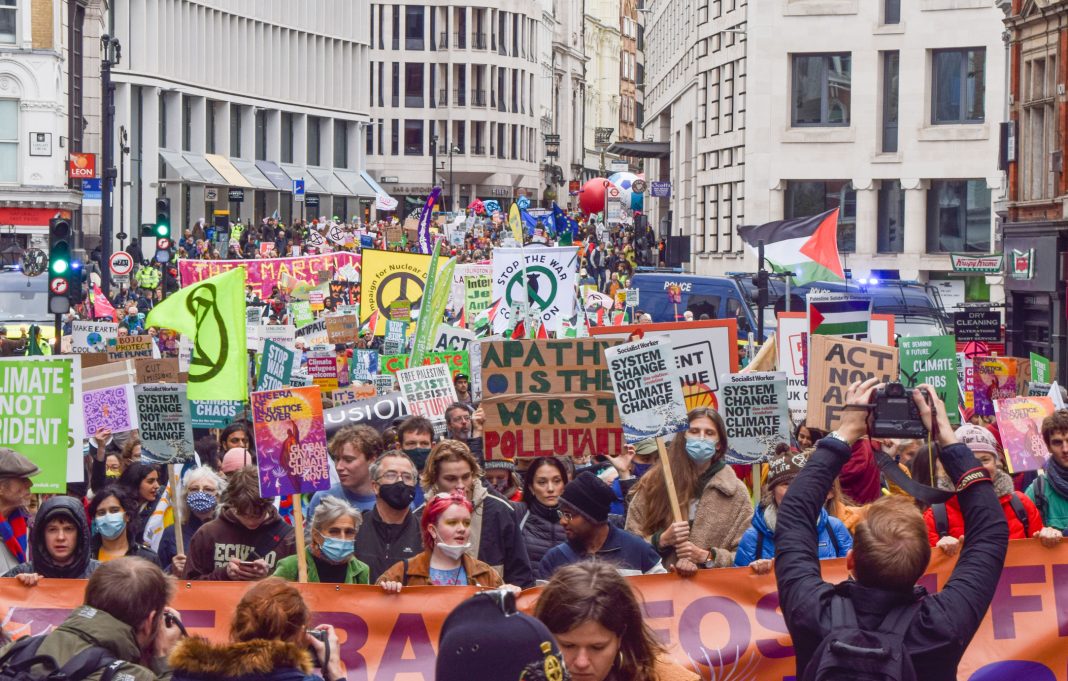COP26 Summit achieves the ISO20121 certificate by delivering a green conference and managing the event in a sustainable way
The ISO20121 certificate, or the International Standard for sustainable event management, sets out the requirements to establish and maintain an event sustainability management system. It requires event organisers to consider all financial, economic, social, and environmental factors when planning.
The UK Government appointed Arup and Crowberry as technical sustainability advisors to attain the certification. BSI, British Standards Institution, provided an independent audit for certification of compliance.
Organisations and event managers adopting ISO20121 are required to demonstrate that they are minimising potential negative impacts on the environment, communities, and local economy. In this case, COP26 included demonstrations of the positive impacts of the summit on local communities.
Large-scale events can put pressure on local resources such as water and energy and potentially create significant waste. Other issues can arise from neighbouring communities who could be averse to mass amounts of conference-goers being in their area.
“Adopting a sustainable event framework to leave a legacy to be proud of”
COP26 President Alok Sharma said: “Sustainability was at the core of COP26 and I am proud that the UK has added yet another impressive standard of environmental compliance to the event with the ISO2021 certification.
“To build on our work with ISO20121, COP26 will also be a carbon-neutral event and become the first COP to have achieved PAS2060 validation on carbon neutrality. This will make good on our priority to reduce and avoid emissions at the highest level.”
What are the seven COP26 Sustainability Governing Principles?
- Actively manage potential impacts on the environment and local community and identify opportunities to deliver environmental and social value
- Provide an accessible and inclusive setting for all
- Encourage healthy living
- Ensure a safe and secure atmosphere
- Encourage more sustainable behaviour
- Promote the use of responsible sources and responsible use of resources throughout the supply chain
- Leave a positive legacy
Proving their consideration of all aspects of sustainability, the COP26 Unit has worked collaboratively with HMG teams, delivery partners and other stakeholders.
They included detailed assessments of all factors of the event, including the Blue Zone and Green Zone Venues, Transport, Security, Suppliers, Catering and Health and Safety. Using the ISO20121 framework, COP26 was able to “manage every aspect of the event in a sustainable way”.
What actions did COP26 take to support the Sustainability Governing Principles?
The conference prioritised low carbon alternative energy sources, such as electric and low emission vehicles, solar energy for temporary traffic lights and Hydrotreated Vegetable Oil (HVO) in generators, over the use of diesel. This included stern requirements on supplier procurements and with partners to maintain this sustainable promise.
COP26 further announced how it encouraged delegates to use low carbon, active travel such as walking and cycling or public transport where possible. As well as this, they provided catering which prioritised locally sourced and in-season food, minimising mileage for transportation and supporting local businesses.
Following this, COP26 allegedly hired local people for specific event roles, reducing transport carbon emissions and inviting local culture. They further supplied sustainable PPE – which was washable and included filters – to follow local COVID regulations and ensure attendee safety.
Furniture was additionally repurposed, provided by Ikea UK, to furnish the conference. This involved working closely with Glasgow City Council to ensure the furniture is given a second life at charity stores and/or given to local community projects across the city.
How did COP26 fallback?
While COP26 promotes its sustainable achievements during the conference, the public still has critiques regarding the menu and transport elements of the summit.
Some highlighted issues with the international travel of conference-goers, for both reasons of COVID-19 safety and the carbon emissions produced from the methods of transportation used, such as attendees flying in, travelling by train, or travelling by car.
Allowing world leaders and delegations to fly into Glasgow and not using vaccine passports at the conference , then a few weeks later placing everyone else in Scotland (who let’s face it most couldn’t care less about COP26) into more restrictions is completely wrong.
— Ryan Capperauld (@ryancapperauld) November 16, 2021
Others noted that although the conference discussed food sustainability on numerous committees, it still served meat on its conference menu. Meat is known to have an extremely high carbon footprint, degrading land, and causing wildfires, the conference failed to promote a vegetarian or vegan diet in pursuit of a ‘sustainable’ outcome.
"How is it possible to produce 2,300 words of documentation on sustainable food and climate change without once mentioning meat?" https://t.co/CFwRwquQDl
— Elisa Aaltola (@EAaltola) November 16, 2021
While sustainability is at the forefront of the conference’s press and media, accountability and transparency may be more important. Climate Scientist Peter Kalmus said: “Unless COP26’s failure is recognised as a failure, there is no way to learn from it.”











